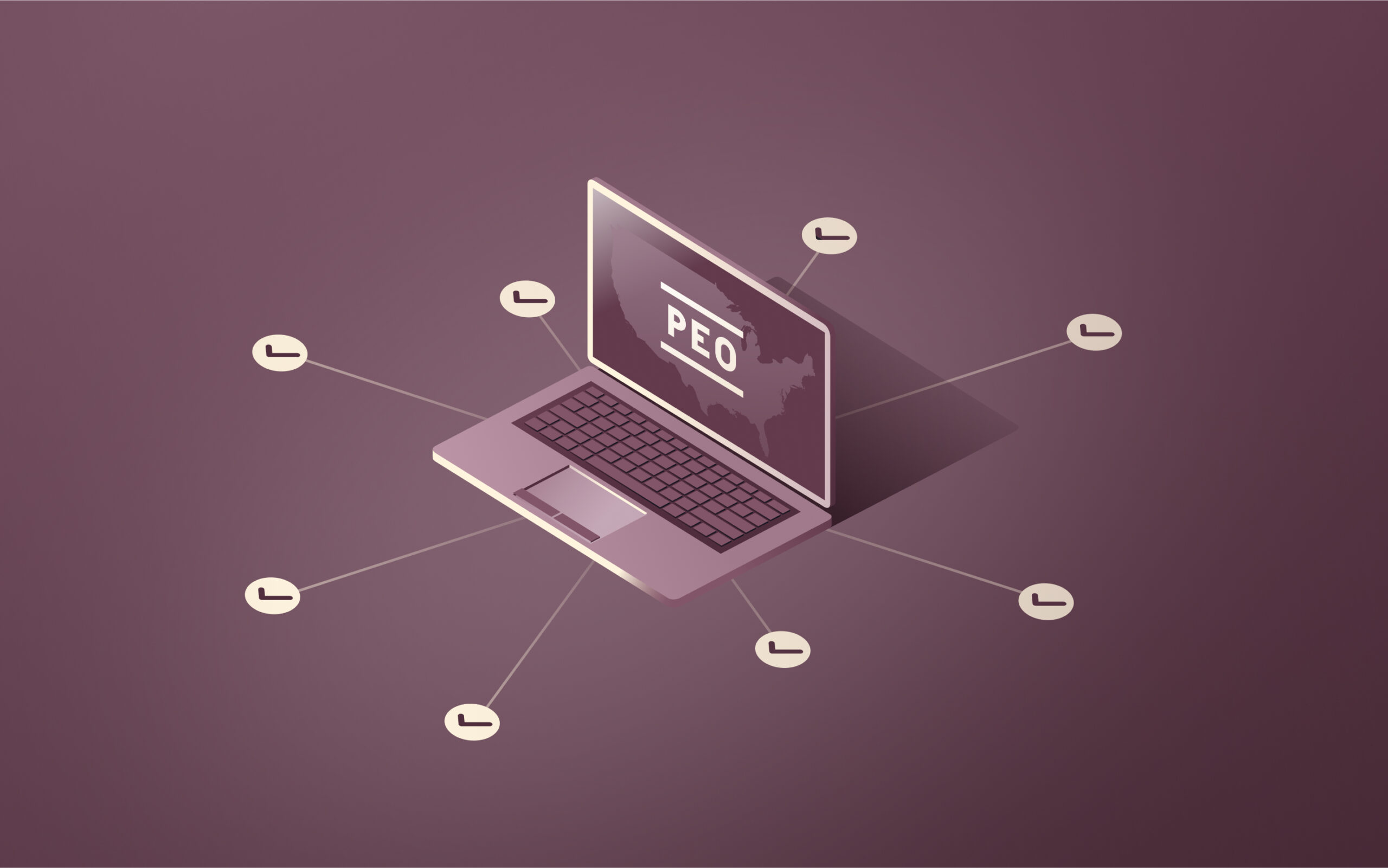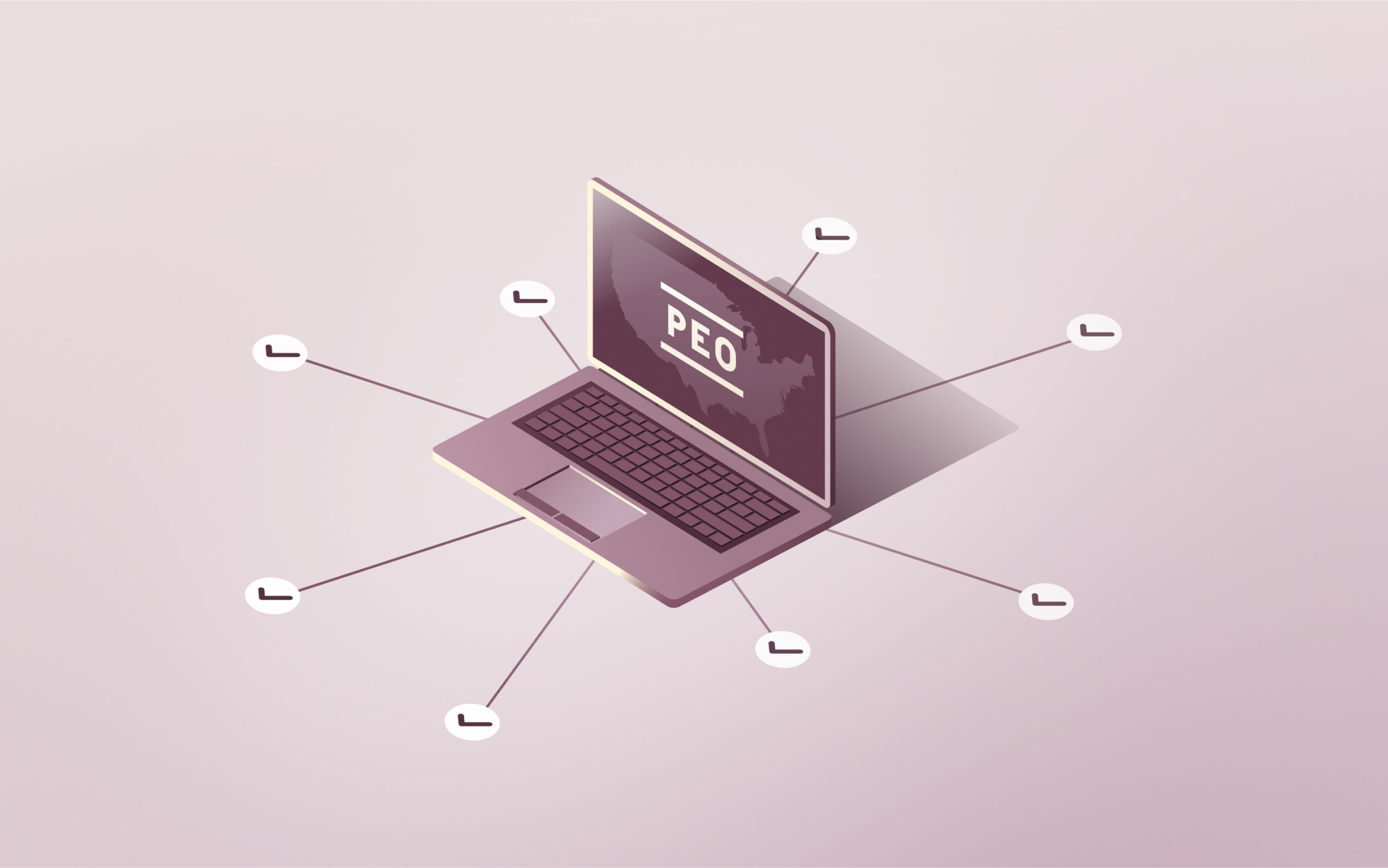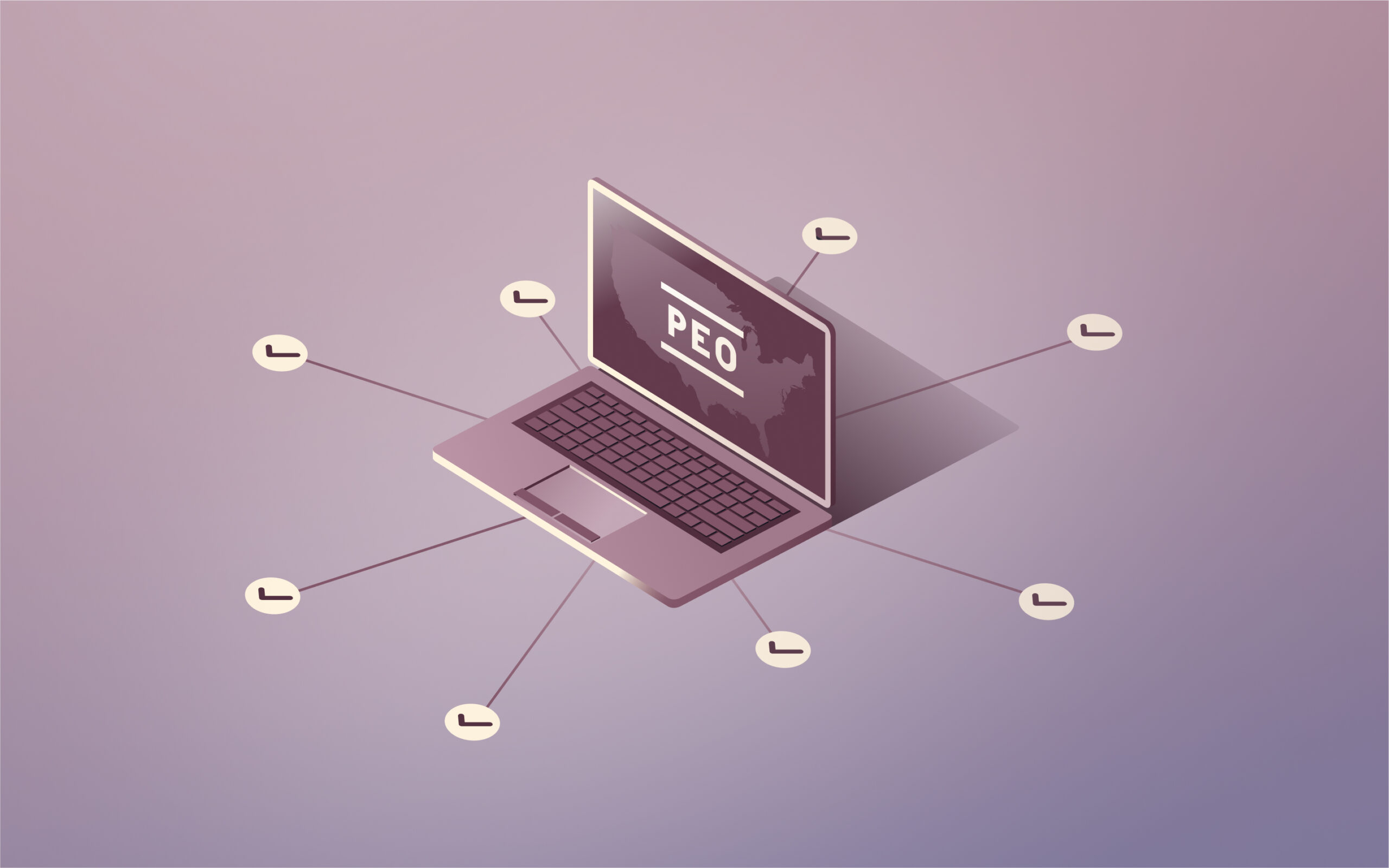PEO in Georgia [2025]

Georgia businesses are always looking for ways to streamline their operations and lower administrative costs. For many, a professional employer organization (PEO) is the answer. PEOs can help small and medium-sized businesses lower the demands on their internal human resources team by simplifying and automating many administrative HR processes, including payroll administration, benefits, compliance, and workers’ compensation. By leveraging the strengths of a PEO, businesses can access and offer their staff better benefits at a lower cost, too.
The Peach State sits near the top of business friendliness rankings. The corporate tax rate is 5.75%, which is close to the national average. And the cost of living is higher than average, with residents paying a 4% state sales tax plus any required local sales taxes. Access to affordable benefits and lower HR costs through a PEO can help many businesses operating in the state, offsetting some of those taxes.
There are a lot of options to consider if you decide to partner with a PEO—and this article can help. Automatic state tax registration, ACA and COBRA administration, and remote IT device management are just a few reasons why Rippling PEO makes it easy to employ and onboard people in Georgia and throughout the US.
Benefits of using a PEO in Georgia
A Georgia PEO company can reduce your administrative HR load through automation, provide access to better and lower-cost benefits, provide your business with valuable expertise and support, ensure compliance with federal and state regulations, and much more.
Offload your administrative HR work
When you become a part of a PEO, it co-employs your workforce, resulting in a division of employer responsibilities between you and the PEO. In this co-employment agreement, you become the worksite employer, retaining full control over hiring, termination, wages, and strategic decision-making for your company—such as marketing, research, sales, and customer support.
The PEO assumes the role of administrative employer and employs your workers under its federal tax identification number (EIN), granting it the ability to oversee employment-related HR tasks such as payroll, compliance, benefits management, risk mitigation, and other duties.
PEOs use a blend of technology, skills, and established procedures to optimize HR management. This allows your company’s HR team to prioritize more critical strategic tasks that directly impact your success without the burden of hands-on admin work.
Better employee benefits, at a lower price
The popularity of PEOs continues to grow. The latest figures from the National Association of Professional Employer Organizations (NAPEO) show that over 500 PEOs operate in the US. These PEOs co-employ 4.5 million workers at more than 200,000 companies. Because PEOs “employ” many people from different companies, they can negotiate lower-cost benefits with insurance providers.
PEOs also utilize economies of scale to provide access to comprehensive benefits plans to the employees of the businesses they partner with. These benefits often include health insurance, life insurance, long-term disability insurance, mental health support, retirement plans, worksite benefits, dependent care, and more. Offering robust, attractive benefits can help businesses recruit and retain exceptional talent, which can be challenging for them to do independently.
Under the federal Affordable Care Act (ACA), employers with 50+ full-time or full-time equivalent employees must provide healthcare benefits. Georgia doesn’t have its own legislation requiring healthcare insurance, so federal law takes precedence. A PEO can help Georgia employers provide required healthcare benefits and access to highly desirable benefits that employees want—at lower costs than they could normally obtain.
Worry-free compliance with Georgia laws
PEOs help businesses of all sizes comply with complex and ever-changing federal labor and employment regulations—and state-level and local Georgia laws. Georgia’s minimum wage is a good example.
The statewide minimum wage is $5.15 per hour, with some exceptions, which is well below the required federal minimum wage of $7.25 per hour. In nearly all cases, workers are covered by the federal Fair Labor Standards Act (FLSA), meaning most employees are subject to the federal minimum wage law and must be paid $7.25 an hour. There is an exemption for employees under 20 years of age. They can be paid a “training wage” (subminimum wage) of $4.25 an hour for the first 90 days of their employment or until they turn 20.
It can be challenging to stay current with the various minimum wage requirements, particularly if you have remote employees in Georgia or across the US. With a PEO like Rippling, you can rest easy knowing that minimum wage violations will be automatically flagged based on employees' locations, ensuring you never violate local laws.
PEOs provide legal and compliance assistance in many areas beyond just minimum wage requirements. They can assist you in maintaining compliance with:
- Payroll regulations
- Worker classification (employees and contractors)
- Issuing and filing tax forms
- Reporting, collecting, and submitting payroll taxes to the proper authorities when due
- Complying with other wage regulations, such as overtime laws
- Benefits-related laws
- Federal sick leave laws (FMLA)
- The Affordable Care Act (ACA)
- COBRA
- FSA
- HSA
- Other relevant benefits regulations
- Labor laws
- Workers’ compensation insurance requirements
- Equal Employment Opportunity (EEO) regulations
- Displaying state-mandated labor posters
Compliance support is a significant benefit of using a PEO, as violating payroll laws can result in costly fines and penalties. The IRS estimates that 40% of small businesses pay these penalties yearly.
Dedicated support team
PEOs are experts in all things HR. By partnering with a PEO, startups and businesses of all sizes can access valuable HR resources they may not have internally. A PEO can help you save time and money while offering guidance on streamlining important HR tasks such as managing benefits, creating employee handbooks, training managers, reviewing safety practices, and addressing any other HR challenges that may come up.
What to consider when evaluating a PEO service in Georgia
Business owners in Atlanta, Savannah, or anywhere in Georgia can choose from a variety of PEO service providers. Keep these factors in mind to find the best fit for your company:
- What are your business and HR needs? Some of the typical services offered by a PEO include:
- Payroll services
- Tax withholding, compliance, and filing
- Recruiting and onboarding assistance
- Benefits administration
- Ensuring safety compliance
- Risk mitigation
- Time and attendance tracking
- Regulatory compliance
- HR outsourcing
- What is your budget? PEOs employ varying pricing models, usually involving either monthly fees per employee or a percentage of each payroll cycle. If your company has aspirations for growth and expansion, it’s important to think about whether you’ll be able to afford the expense as your employee count rises.
- Reputation and expertise. Has the PEO partnered with many businesses in Georgia? Is it highly rated? You might want to consult review sites like Capterra and G2 for insights into the experiences of past and current clients.
- Employee benefits. Does the PEO offer access to a wide range of affordable, high-quality benefits plans? Ensure that they align with the expectations and needs of your employees.
- What are the renewal rates for benefits? Some PEOs hike renewal rates, leaving companies with unforeseen expenses or the unexpected complication of finding a new PEO after just one year. Transparent information about pricing changes will allow you to anticipate potential increases.
- Business integration. How will the PEO be incorporated into your current systems, tools, and technology?
- Does the PEO specialize in certain industries? If your company operates in a specialized field, working with a PEO with expertise in that sector can be helpful.
- Does the PEO specialize in specific legal or compliance areas? It could be beneficial to find a PEO with specific expertise if your business is required to comply with particular federal and state regulations or handle other legal concerns.
- Exit plan. As time passes, you may want to bring your HR work back in-house or try a new business solution. However, leaving a PEO can be complicated and often involves starting from scratch with new systems. It’s a good idea to understand what the process would entail before joining a PEO.
Why Rippling PEO is the right choice for your Georgia business
By synchronizing HR, IT, and Finance in a single platform, Rippling PEO leads the way as the first PEO to streamline and simplify all your HR busy work—from a 90-second onboarding procedure to managing your IT issues remotely. While most PEOs use ancient 1980s software, Rippling runs on modern software that delivers an innovative product and a straightforward user experience.
We manage all critical HR and compliance tasks, including tax filing, payroll processing, and benefits administration. Your team also gains access to Fortune 500-level benefits packages at affordable prices.
With Rippling, you get:
- HR, IT, and Finance integrated into a single platform
- Robust and personalized reporting of employee data
- Advice and tools designed to efficiently manage remote teams, including virtual onboarding, remote device management, and location-specific labor law compliance oversight
- Access to high-quality benefits packages with below-average, predictable renewal rates
- Automatic identification of federal, state, and local non-compliance issues, along with strategies for fixing them
- Automated risk assessment and management, including ACA and COBRA administration, employee anti-harassment training, and distribution of mandatory workplace posters
- Access to an extensive selection of HR tools, manuals, and templates
Should you ever decide to handle HR internally, switching between Rippling PEO and our all-in-one workforce management platform is a breeze. Unlike other PEO providers, which require a painful transition, Rippling makes it seamless. Your HR, payroll, and employee data remain securely stored in your account, and any integrations with other systems stay functional. Your employees can continue accessing the platform with their existing logins and use Rippling like they always have.
FAQs about PEOs in Georgia
What are PEOs, and how do they work?
PEOs are companies that collaborate with businesses to offer a broad range of HR solutions, including payroll processing, risk management, compliance management, employee benefits administration, and tax reporting. Under a co-employment model, the PEO assumes legal responsibility for a company’s employees for tax purposes.
How does a PEO arrangement affect control over my employees?
Your business will continue to maintain authority over your operations and staff supervision— including hiring and firing. The PEO oversees administrative, employment-related HR services.
What is a certified PEO?
Certified PEOs (CPEOs) have passed an IRS assessment in order to gain this certification. It doesn’t represent an endorsement from the IRS. The certification is completely voluntary and involves criteria related to the expertise, finances, reporting, and history of the company. In the past, the designation could offer tax advantages to the businesses the PEO partnered with, but now, the benefits of PEO certification are largely obsolete.
What size company would benefit from a PEO?
Although PEOs are suitable for businesses of all sizes, small- to mid-sized companies typically gain the most advantages. PEOs help reduce administrative expenses and headaches, allowing teams to focus on more strategic initiatives. The partnership also provides access to top-notch benefits packages that would otherwise be out of reach for smaller companies.
How does a PEO charge for its services?
The cost can vary depending on the scope of services offered and the number of employees in the company. PEOs may use a per-employee flat rate or a percentage of the total payroll to calculate the cost.
What is the implementation process, and how long does it take to go live?
First, the PEO gathers the necessary information about your staff and systems, including payroll and employment records, benefits information, and tax records. They will then implement processes to handle your HR administrative work, often integrating their platform with your systems. Training sessions may be held to explain the new benefits, protocols, and technologies to your employees.
The length of time to complete the process can vary according to the size of your company and scope of services, taking anywhere from a few weeks to a couple of months.
Are PEOs regulated?
Yes, PEOs are regulated at both state and federal levels, and many gain additional accreditation through industry organizations.
Are PEOs in Georgia required to have special certifications or licenses?
PEOs operating in Georgia do not require a license or special certification. However, they do have to meet bonding and reporting requirements. PEOs also require a Certificate of Authority from the Secretary of State to operate a business in Georgia.
What happens if I want to terminate my relationship with a PEO?
Ending a partnership with most PEOs means removing their systems from your company, which can be a time-consuming and disruptive experience. Afterward, you need to search for alternative systems to handle the tasks the PEO was managing for you.
Rippling PEO allows for a simple transition, and terminating the PEO is as simple as switching it off. Your data, integrations, and systems remain intact as you move onto our all-in-one workforce management platform.
In what states is Rippling PEO available?
Rippling PEO is available across the US.
Disclaimer: Rippling and its affiliates do not provide tax, accounting, or legal advice. This material has been prepared for informational purposes only, and is not intended to provide or be relied on for tax, accounting, or legal advice. You should consult your own tax, accounting, and legal advisors before engaging in any related activities or transactions.





